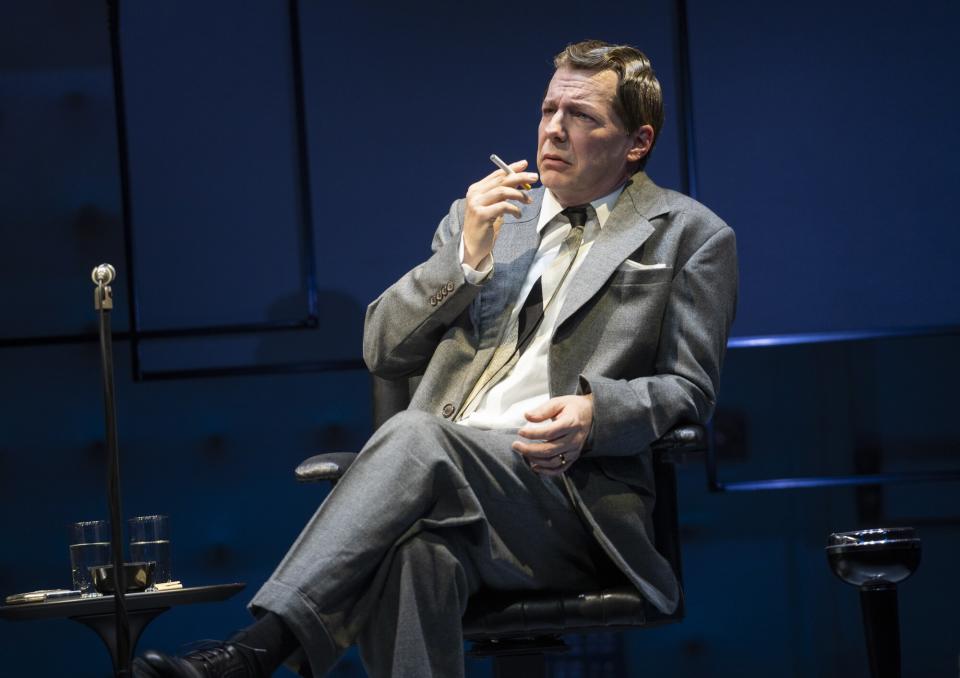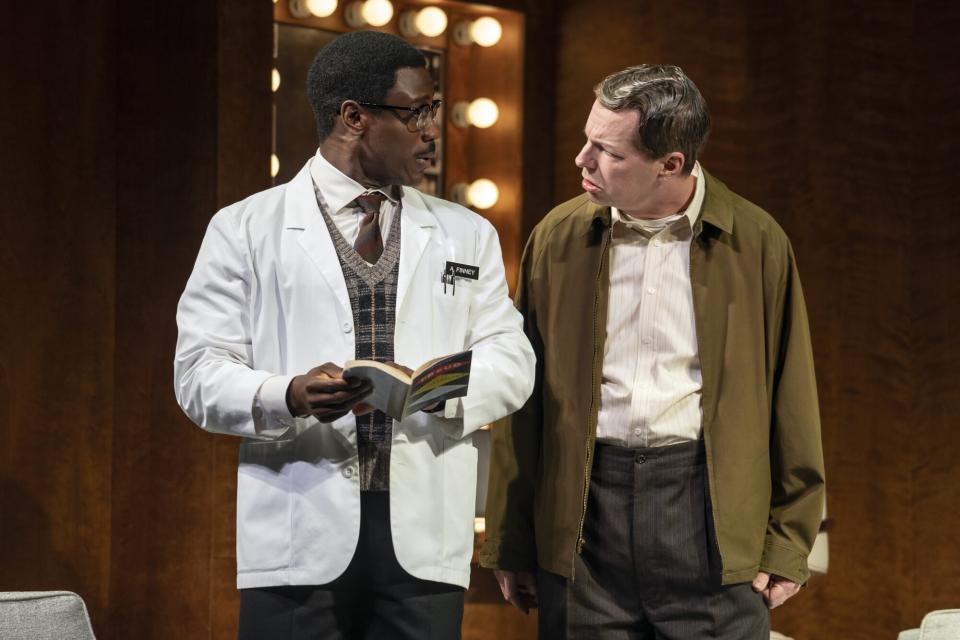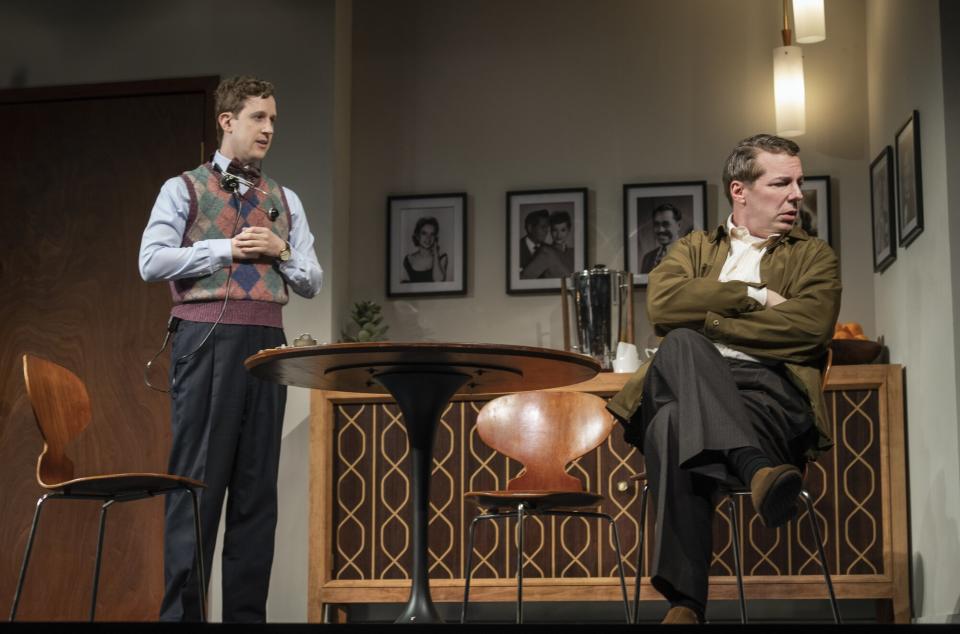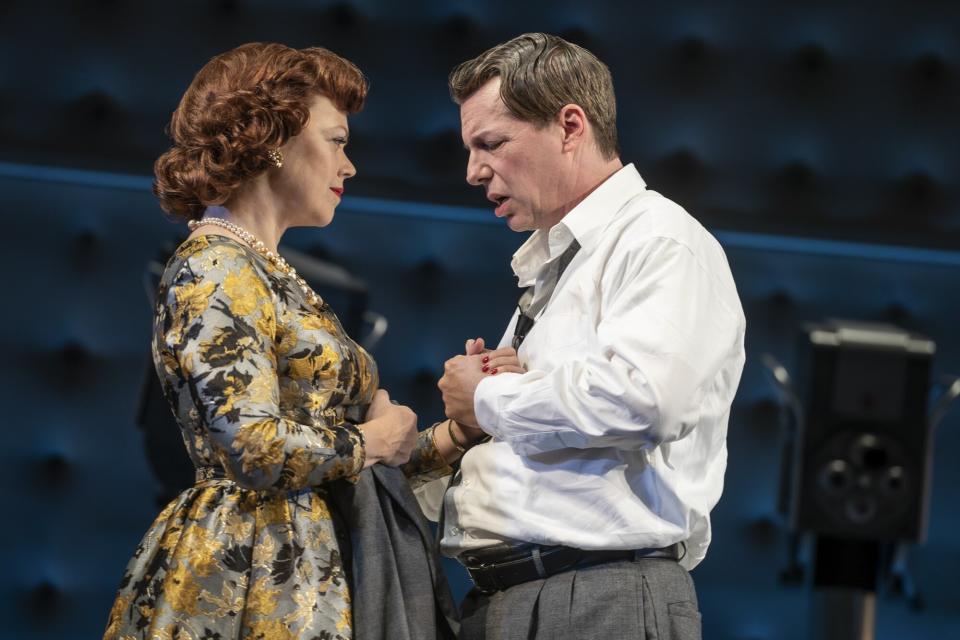Good Night, Oscar review: More like 'Hello, Tony' — Sean Hayes strikes gold on Broadway

- Oops!Something went wrong.Please try again later.
- Oops!Something went wrong.Please try again later.
- Oops!Something went wrong.Please try again later.
- Oops!Something went wrong.Please try again later.
The traditional multi-cam sitcom is basically a filmed play. So it goes to reason that a great sitcom performer would be a great theater performer, and vice versa. On Will & Grace, Sean Hayes was a whirlwind of comic energy, displaying a level of physical and verbal dexterity that's all but impossible to come by on today's far less animated sitcom offerings.
Witness how he storms into a scene, delivering a riotously caffeinated monologue, words coming a mile a minute, the pacing so precise you could set a watch to it. Has anyone been better at making a memorable entrance or exit since Cosmo Kramer? A virtuosic performer, Hayes has really never had material, since the best seasons of Will & Grace, that fully utilized his skills.
In Good Night, Oscar, opening April 24 at the Belasco Theater in New York City, Hayes finally has that material — and he's bringing it to Broadway after the show premiered in Chicago last year. Written by Pulitzer- and Tony-winner Doug Wright (I Am My Own Wife, Grey Gardens), Good Night, Oscar is a play ostensibly about pianist, composer, and noted wit Oscar Levant — through whom the show offers commentaries on the nature and burden of genius, exploitation of mental illness, and the polarizing roles of comedy and the media in our society.

Joan Marcus Sean Hayes in 'Good Night, Oscar'
Levant was born in 1906 and rose to prominence in New York as a gifted pianist before heading out to Hollywood where he befriended George Gershwin and started composing music for film. He eventually found his way in front of the camera, appearing most famously as Gene Kelly's best friend in the Best Picture winner of 1951, An American in Paris, performing Gershwin's "Concerto in F." Levant also became well-known for his quick wit and devastating one-liners as a guest on game shows and talk shows.
A hopeless neurotic, Levant developed an addiction to prescription drugs and spent much of his later years in and out of mental hospitals, committed by his wife June. He died of a heart attack in 1972 at age 65, discovered by June after she went to retrieve him for an interview with then-photojournalist — and future Murphy Brown star — Candice Bergen.
This production of Good Night, Oscar, directed by Lisa Peterson, arrives in a cloud of cigarette smoke and a hint of controversy. In October 2022, after an interview with Hayes about Good Night, Oscar appeared in The New York Times, playwright David Adjmi took to Facebook to claim he had written an earlier version of the play and pitched it to Hayes and producer Barbara Williams, who rejected it.

Joan Marcus Marchánt Davis and Sean Hayes in 'Good Night, Oscar'
Adjmi went on to say that his version of the play was blocked from going into production, which Hayes and the Good Night, Oscar team denied in a statement in response.
Adjmi's version was apparently darker in tone and both he and Hayes et. al. agree they parted ways over creative differences. A follow-up interview with The Times ponders whether Hayes had a longstanding interest in Levant or if Adjmi, as he further claimed, had to convince him. This BTS drama is a rare glimpse into how the showbiz sausage is made, which feels highly appropriate for this particular show.
Set in 1958 Hollywood on the night of The Tonight Show's West Coast debut with host Jack Paar (Ben Rappaport), Good Night, Oscar follows the machinations involved in getting — and keeping — Hayes' Levant on the air while out on a four-hour furlough from a mental hospital.

Joan Marcus Sean Hayes and cast in 'Good Night, Oscar'
Emily Bergl plays Levant's long-suffering — but also complicit — wife June; Marchánt Davis is Alvin Finney, the young and ambitious orderly from the mental ward trying to keep Oscar alive long enough to get him back to the hospital; Peter Grosz is harried NBC executive Bob Sarnoff, and Alex Wyse is his nephew and Jack's new assistant Max Weimbaum; completing the cast is John Zdrojeski as the ghost of George Gerswin.
Paar fights to have Levant as a guest because he's controversial. He knows that Oscar is reliable for withering bons mots, that his audience will eat them up, even if NBC will surely get into trouble with the Catholic League of Decency. But that's kind of the goal. Paar perfected late-night television during his stint at The Tonight Show (1957-1962), turning it into the celeb gabfest and loosely controlled three-ring circus we know it as today. He understood the power of spectacle and controversy during TV's young, naïve years.
In 1961, a tearful Paar walked off The Tonight Show because NBC had cut a joke. A joke that included the letters W.C., for water closet. He didn't come back for three weeks. This is the Jack Paar of Good Night, Oscar, a charmingly smarmy wise guy who believes comedy is a sacred cow because it gleefully slaughters sacred cows. He and Oscar Levant have that in common. They go to war over Oscar's right to joke about politics, religion, and sex to staid 1950s Middle America.

Joan Marcus Sean Hayes and cast in 'Good Night, Oscar'
But if you write a play about comedy, God help you if it isn't funny. After all, nothing sucks the humor out of a room more than explaining why a joke is funny. Good Night, Oscar, however, has a gold mine of witticisms from Oscar Levant, which Wright peppers all throughout the play, in one form or another: "There's a fine line between genius and insanity. I have erased this line." "Now that Marilyn Monroe is kosher, Arthur Miller can eat her." When Paar once asked him what he did for exercise, "I stumble and then I fall into a coma."
Aside from Levant, the play also has a gold miner in Hayes, who utilizes that deft comedic timing to wring every last laugh out of those 60-year-old lines. Now 52, Hayes is still an incredible physical comedian, but he uses his body to convey just how tired and broken Oscar Levant is, how playing the clown has taken its toll. Levant's career as a wit often overshadowed his prowess as a pianist and Good Night, Oscar plays like Amadeus with Levant as the Salieri to Gershwin's Mozart.
He can't finish any piece he starts composing and he's forever eulogizing Gershwin, who died at 38 of a brain tumor, playing his music instead of creating his own. So much of Levant's frustration comes from being haunted, figuratively and literally, by Gershwin's impossible-to-replicate place in the firmament of the Great American Songbook. Levant is often called a genius — by Paar, by cultural critics of the day — but he struggles with the term since he's had a brush with what he considers true genius, in Gershwin, and is afraid he'll never live up to it.

Joan Marcus Sean Hayes and cast in 'Good Night, Oscar'
In a climactic scene, Hayes plays "Rhapsody in Blue," Gershwin's 1924 composition bridging classical music and jazz. A classically trained pianist since age 5, Hayes eventually gave up his musical aspirations, which didn't thrill him as much as acting. He even brings physicality to his piano playing, throwing himself at the keys, his head darting up and down, quizzical one moment, enraged the next, dulcet the next. It's a tour de force. His entire performance. The show rests and revolves around Hayes. Sometimes to its detriment.
The supporting players aren't nearly as interesting, but they're not supposed to be. Bergl's June is steely and dry, but affable, and not above manipulating her mentally ill husband for her own ends. Though she deals with the brunt of Oscar's neuroses, she's also the one who insists on busting him out of the psych ward so he can make Paar's show. She says it's because being on the show will help him, he needs an audience. But the question is often raised whether Oscar's public bloodletting is for his own good or the good of those around him. A classic showbiz paradox.
Rappaport strikes the right balance between making Paar both savior and sadist to Levant, and Wyse never overstays his welcome as the wide-eyed, impressionable Max. Davis is very good as Finney, the relatively thankless role of straight man. And Grosz, a prolific character actor, runs away with every line he gets. He turns a knowing, self-serious speech about the waning integrity of television somehow into a punchline.

Joan Marcus Emily Bergl and Sean Hayes in 'Good Night, Oscar'
The whole Gershwin/Mozart rivalry — with Gershwin acting as Levant's own inner voice, the nagging insecurity that paralyzes him in his daily life — is a gamble, but it adds depth and texture, making Good Night, Oscar into more that just the classic Hollywood parable on the always toxic combination of celebrity and drug addiction. Rather, or also, it's the classic genius parable of being too damn smart for your own damn good. The agony and ecstasy of puns and pianos.
Director Lisa Peterson keeps the production humming along nicely, while Rachel Hauck's set design warmly evokes mid-century Americana. (The Tonight Show set rendered as a padded cell was an especially nice touch.) Still, the show really only takes off once we move from behind the scenes to the main show, as it were, The Tonight Show, where Paar and Levant banter back and forth, enraging the censors and scandalizing Paar's audience.

Joan Marcus Ben Rappaport and Sean Hayes in 'Good Night, Oscar'
Good Night, Oscar does a great job of capturing how immediate television was, when there were three channels and late night was still a novel concept. And the way the show moves from on camera to backstage and back, and the frenzy involved in getting Levant to just sit at a piano, has sitcom energy, but with the dark undertone of Levant's very public coming-undone.
Hayes' piano solo — and the beautiful way it is lit by Carolina Ortiz Herrera and Ben Stanton — easily ranks as the show's highlight, but aside from a few lulls in the early stages of exposition, before Hayes makes another memorable entrance, the entire play is delightful, buoyed by its leading man's performance.
"I'm controversial! People either dislike me or hate me," Hayes as Levant quips, another of Levant's reworked old jokes. While Hayes' Levant is an acerbic, self-destructive, sad-sack of a human being, there's nothing to hate or even dislike about him. Or Good Night, Oscar. Sean Hayes is just too easy to love. A
Related content:

